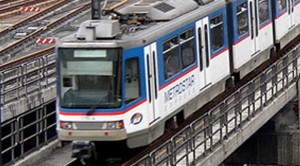The Department of Transportation and Communications is investing billions of pesos to rehabilitate and expand the busy Metro Rail Transit Line 3 in Metro Manila while it weighs the fate of the current maintenance provider, which has racked up at least P45 million in penalties during its one-year contract.
Transportation Secretary Joseph Abaya outlined in a press briefing about P9.7 billion in projects, including the acquisition of 48 new train coaches valued at P3.76 billion to be delivered from September 2015 until the end of 2016, and a private sector-funded P1.09-billion automated fare collection system. Other projects include spending P1.16 billion to overhaul 28 trains, which will be done by 2016, P870 million for ancillary systems and even smaller items, like spending P50 million to replace “obsolete” escalators.
The announcement highlighted the need for improved services after years of neglect, partly due to MRT-3’s complicated ownership structure. The DOTC is facing mounting criticism over the way MRT-3 is being managed, given hour-long queues, packed train cars and frequent breakdowns.
Timelines provided by Abaya, however, showed that congestion at MRT-3 would only start to ease in the latter part of 2015, with about 10 new coaches to be delivered next year. By the time the contract for 48 coaches with China’s Dalian Locomotive and Rolling Stock Co. is completed in 2016, capacity would have increased by 66 percent, the DOTC said.
“The breakdowns are [due to the fact that] we are at the tail-end of the eight-year cycle. [And] the fact that when they did the first overhaul in 2006, it wasn’t the complete and necessary overhaul as required,” Abaya said.
These steps are being made as the government prepares for the takeover of MRT-3, including buying out its private sector owners, for an estimated P54 billion to P56 billion.
Abaya said they planned to complete all requirements up to a compromise agreement with MRT-3 operator Metro Rail Transit Corp. this month but funding was “lagging” because of a recent Supreme Court decision on the controversial Disbursement Acceleration Program (DAP).
“That [funding] should be ready in 2015. By Jan. 1, we should be ready to execute,” he said.
Some of the blame, meanwhile, is being shared by MRT-3’s maintenance provider Autre Porte Technique Global Inc. (APT Global), a Filipino company whose one-year contract ended Sept. 5 and is now operating under an interim “month-to-month” arrangement, or until the DOTC has awarded a new P2.25-billion, three-year maintenance deal, likely in the fourth quarter, unless the department would decide to assume maintenance operations by itself, Abaya said.
Questions are also being raised about the large amounts of penalties APT Global has incurred, or P27.1 million for the first six months of its contract. The company is also facing a single-day fine of P18 million after the entire MRT-3 halted operations for half a day last month after a communications system breakdown.
